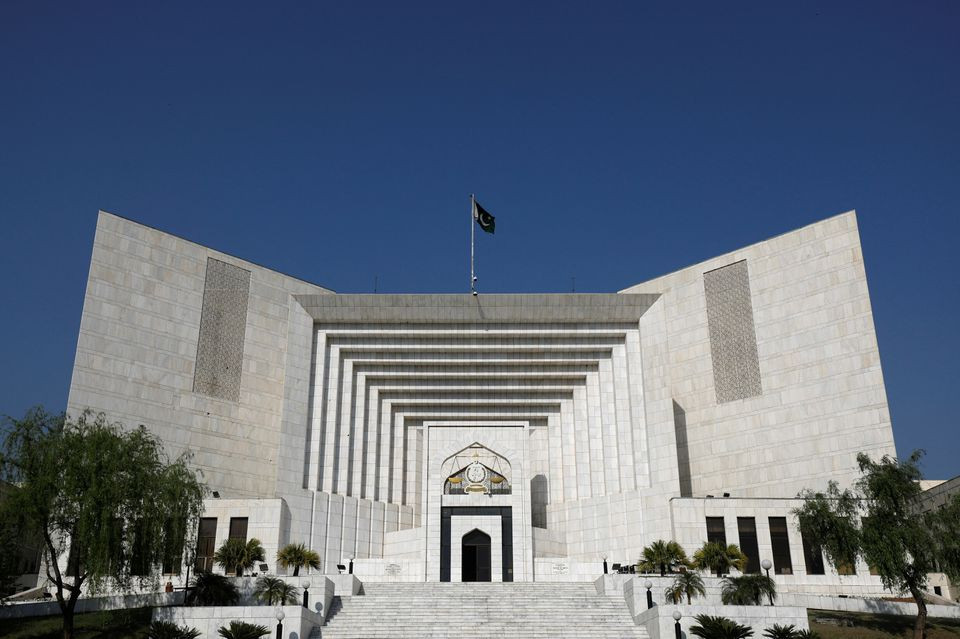SC shields fundamental rights of bail applicants , Court issues detailed judgment on matter of PTI chief’s arrest in May
It would encourage police high-handedness and thereby expose courts to executive machinations in the future
ISLAMABAD ( Web News )
The Supreme Court has held that the right of an accused to seek remedy of pre-arrest bail must be construed in a manner that safeguards and advances the fundamental right of access to justice.
The top court on Friday issued the detailed judgment in the matter of the arrest of former prime minister Imran Khan from the premises of Islamabad High Court (IHC) that was declared unlawful on May 11, 2023, by a three-judge bench.
“The Fundamental Rights of access to justice and fair trial/due process are ordinarily invoked to rectify the illegalities and defects committed during criminal trials and/or proceedings pertaining to the determination of civil rights/obligations,” the court said.
“However, these rights apply equally to bail applications as the latter are directly connected to the liberty of persons,” the 22-page judgment, authored by Chief Justice Umar Ata Bandial, added.
The judgment said that the fundamental right granted by Article 9 of the Constitution was primarily enforced through bail applications, emphasising that the relief of pre-arrest bail was a judicial remedy to accused persons under Section 498 of the CrPC.
The bench led by the chief justice had heard the matter.
Also sitting on the bench, Justice Athar Minallah, agreed with Chief Justice Bandial. However, he will issue an additional note on this matter.
The court also ordered that copies of the detailed judgment would be forwarded to the departments concerned of the federal and provincial governments for their information.
The order noted that the high courts in the country routinely afforded the relief of protective bail to accused persons to enforce their fundamental rights of access to justice and liberty by ensuring their unobstructed access to a competent court.
“In the present case, if the petitioner’s arrest from the High Court’s premises is endorsed, his application for pre-arrest bail filed in the AQT Case before that court will be rendered futile notwithstanding the fact that he surrendered before the High Court and invoked its jurisdiction,” the judgement read.
“This will not only deprive the petitioner of his right to access a competent court to safeguard his Fundamental Right of liberty but will also invite police officials/investigating agencies to treat court premises as hunting grounds for capturing accused persons, especially when the latter seeks judicial oversight of their pending arrests,” it added.
“It would encourage police high-handedness and thereby expose courts to executive machinations in the future. Such a narrow interpretation of the Fundamental Right of access to justice cannot be approved by this Court and so is categorically rejected.”
The judgment noted that the petitioner’s arrest from the biometric verification room of the high court was declared to be invalid and unlawful on the touchstone of violating his fundamental rights under articles 4, 9 and 10A of the Constitution.
According to the judgment, the apex court treated the fundamental right of access to justice to encompass in it the right to invoke the court’s jurisdiction for appropriate relief.
“Assuring a person unimpeded access to the court when he/she has commenced the process of availing a judicial remedy effectively blocks preemptive executive action that attempts to curtail that person’s liberty and his/her right of access to justice.”
The court also noted that the arrest of Imran was invalid and unlawful for violating his fundamental right of access to justice. “The said right is now well-enshrined in the jurisprudence of this Court and forms an integral part of Article 9 (life and liberty of person) and Article 4 of the Constitution (right of persons to be dealt with in accordance with law, etc),” the court said.
“In fact, a person’s Fundamental Right of access to justice has been strengthened by the insertion of Article 10A (right to due process) into the Constitution by the Eighteenth Amendment (2010),” the judgment noted further.
“If a Superior Court for any reason refrains from exercising its contempt jurisdiction, the drawback is that the aggrieved person, who is directly injured by the unlawful actions of the law enforcement agencies, is left without redress,” it continued.
“On the other hand, even if contempt is initiated by a court it may very well be, as has happened in the impugned judgment before us, that the unlawful arrest of a person is validated because the court is focused on the breach of its dignity, sanctity and safety rather than on the violation of that person’s Fundamental Rights.”
While dealing with like matters, the judgment said, the superior courts had traditionally adopted to initiate contempt proceedings against the responsible officials, adding that it was this route that the high court also took in the impugned judgment dated May 9, 2023.
Nevertheless, it continued, such an approach had become inadequate because the contempt route focused on the violation of the court’s dignity, sanctity, and safety and not on the injury inflicted on the aggrieved person.
Moreover, contempt was a discretionary jurisdiction with the court being the sole authority to decide whether to launch contempt proceedings against the contemnors or not, the chief justice said in the detailed judgment.
“The manner and mode in which the arrest was executed, namely, the breaking of the door, glass partitions and windows of the biometric verification room and the manhandling and injuring of a number of lawyers, High Court staff and police personnel undermined and lowered the authority of the High Court and disturbed its decorum.”
As a result thereof, the detailed judgment continued, the short order dated May 11, 2023 declared the arrest of the petitioner to be invalid and unlawful for violating the dignity, sanctity, and safety of the high court.
“It is a well-settled principle that the dignity, sanctity and safety of the courts for the benefit of all concerned stakeholders are inviolable and cannot be compromised. This is because courts of law are sanctuaries which the people approach to seek justice with the assurance that they will be able to pursue their relief freely in a safe, orderly and dignified environment,” the court said.
“The breach of this assurance undermines the effective dispensation of justice by deterring people from seeking the resolution of their disputes from the courts. Therefore, to safeguard the peoples’ right to access the Superior Courts and accordingly to seek justice, Article 204 of the Constitution has conferred this Court (and the High Courts) with the power to punish any person interfering with or obstructing the process of the Superior Courts in any way or prejudicing the determination of a matter pending before them.”


